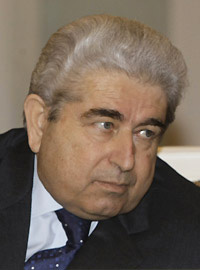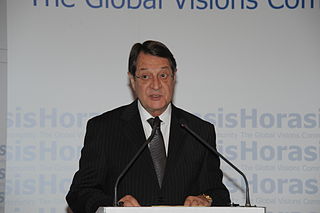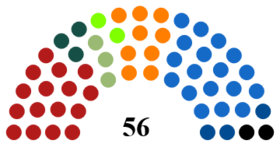
The Movement for Social Democracy is a Greek Cypriot nationalist, social-democratic political party in Cyprus.

The Democratic Party is a Greek-Cypriot nationalist, centrist political party in Cyprus founded in 1976 by Spyros Kyprianou.

Elections in Cyprus gives information on election and election results in Cyprus.

The European Party was a political party in Cyprus founded in 2005, largely out of the parties New Horizons and European Democracy. In March 2016, it dissolved to merge into the Solidarity Movement.

Nicos Anastasiades is a Cypriot politician who has been President of Cyprus since 2013. On 4 February 2018, he was re-elected for a second five-year term. Previously, he was the leader of Democratic Rally and a Member of Parliament for Limassol.

The Cypriot presidential election of 2008 was held on 17 February 2008, with the runoff held on 24 February 2008. The second-round winner, and thus the President of Cyprus for the next term, was Dimitris Christofias.

Marios Garoyian is a Cypriot politician. He served as leader of the Democratic Party from 2006 to 2013.
Eleni Theocharous is a Cypriot pediatric surgeon and politician who is a member of the political party Solidarity Movement. She was elected to the European Parliament in 2009 and re-elected in 2014. Between 2001 and 2009, Theocharous was a member House of Representatives of Cyprus for the Limassol constituency.

Parliamentary elections were held in Cyprus on 22 May 2011 to elect the 56 Members of the House of Representatives. They were won by the Democratic Rally, who increased their seats from 18 to 20. The governing Progressive Party of Working People also gained a seat, bringing them up to 19. The Democratic Party lost two of their 11 seats and the European Party lost one of their three seats. The Movement for Social Democracy held on to their five seats.

Presidential elections were held in Cyprus on 17 February 2013. A runoff was held on 24 February 2013. Nicos Anastasiades of Democratic Rally won the election. The other candidates were Stavros Malas of the Progressive Party of Working People (AKEL); Praxoula Antoniadou of the United Democrats; Lakis Ioannou with the support of LASOK; Loukas Stavrou; ELAM's Giorgos Charalambous, Giorgos Lillikas of Movement for Social Democracy (EDEK); and independents Andreas Efstratiou, Makaria-Andri Stylianou, Kostas Kyriacou(Outopos) and Solon Gregoriou. Although the president Demetris Christofias was not term-limited, he did not seek re-election in 2013.

Nicos Nicolaides is a Greek Cypriot politician. He is currently the Mayor of Limassol. From May 2011 to December 2016, he was a Member of Parliament in the House of Representatives of Cyprus, representing the Limassol constituency under the banner of social democratic party EDEK.
A joint declaration was made on 11 February 2014 at the start of renewed negotiations to settle the Cyprus dispute. The following talks between Nicos Anastasiades, President of Cyprus, and Derviş Eroğlu, President of Northern Cyprus, were stalled in October 2014.
Cyprus's component of the 2014 European Parliament election was held on Sunday, 25 May 2014.

The Solidarity Movement is a Greek Cypriot nationalist party in Cyprus. It was founded in 2016 by Eleni Theocharous.

The First Anastasiades government was the government of Cyprus, forming the Council of Ministers, in 2013–2018. Sworn in on 28 February 2013, it initially consisted of 13 ministers representing a governing coalition of President Nicos Anastasiades' Democratic Rally party (DISY) with DIKO and EVROKO parties. After the withdrawal of DIKO from the coalition in 2014, the government coalition consists only of DISY and EVROKO members, as well as other, independent technocrats. Following Anastasiades' victory in the 2018 election, the Second Anastasiades government was formed, with a very similar composition.
Greek-Cypriot nationalism is an ethnic nationalism emphasising Greekness of the Cypriot nation, whilst contrasting with Greek nationalism which aspires to integrate Cyprus into Greece as its main and number one objective. Having abandoned the idea of enosis, Greek Cypriot nationalists now have the aim of a Greek Cypriot-controlled state with close relations to Greece, the "motherland". Variants of the nationalism have been espoused by the centre-right Democratic Party (DIKO), the right-wing New Horizons, Socialists (EDEK), the Greek Orthodox Church of Cyprus, and nationalist elements within the centre-right Democratic Rally (DISY).

Presidential elections were held in Cyprus on 28 January 2018. As no candidate received a majority of the vote in the first round, a run-off was held on 4 February between the top two candidates, incumbent President Nicos Anastasiades of the Democratic Rally (DISY) and Stavros Malas of the Progressive Party of Working People. Anastasiades emerged as the winner with 55.99% of the vote.






























